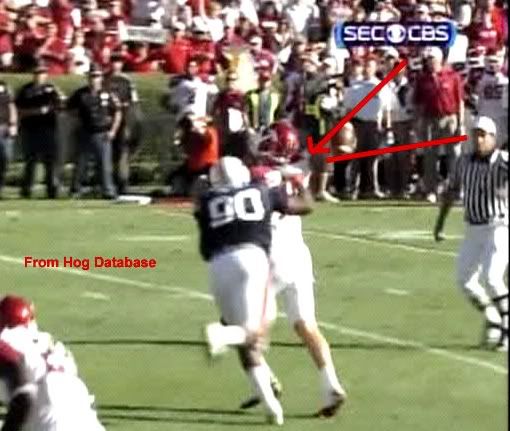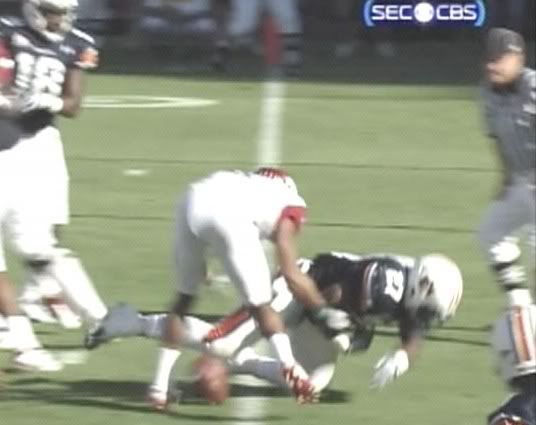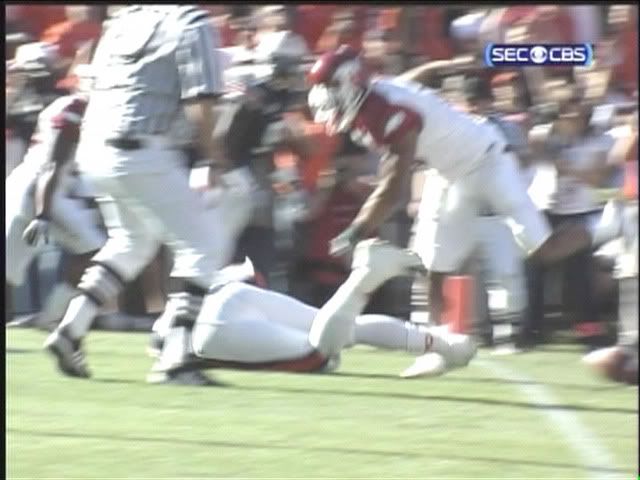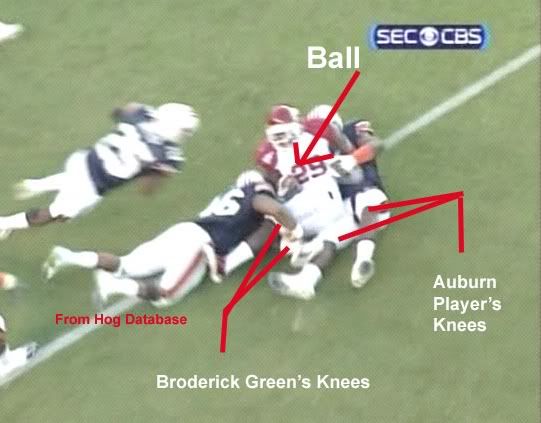Sportingnews.com columnist Matt Hayes wrote a piece on November 8, 2009, entitled Conspiracy theorists about SEC officiating might be on to something where he places bad 2009 SEC officiating calls in line. He lists LSU and Georgia on October 3, Arkansas at Florida on October 17, Florida at Mississippi State on October 24 and finally LSU at Alabama on November 7. The latter two were specifically matters for replay officials, and everyone knows that an entire officiating crew was suspended following Arkansas and Florida match up. When he wrote the piece he had not encountered the Arkansas at LSU game where officials stopped the clock on the final drive despite an LSU running back landing two yards in bounds. Nor did he have the benefit of the Arkansas at Auburn game on Saturday or other calls this year.
Hayes was not alone in pointing out the circumstances back then. Sports Illustrated’s Andy Staples , Dan Wetzel of Yahoo! Sports, Greg Doyle of CBSSports.com, and others of similar or lesser stature commented on SEC Officiating throughout 2009.. Some acknowledged the conspiracy theory. Wetzel said in essence that it was full of malarkey. Doyle spouts off a bunch of psycho babble about why the officials would do such things. He must be from California. However, Hayes put the ball between the numbers when he wrote:
“The breaks that keep on giving. After the coaches at Tennessee, Arkansas and Mississippi State all complained about bad calls — the SEC admitted as much in the Arkansas loss to Florida — Slive directed his closed-mouth mandate. The problem: The bad calls keep coming.
“The shame of it all is here is a moment where the SEC should be standing tall and thumping its chest and bragging about another No. 1 vs. No. 2 matchup in the league’s championship game — a title matchup that will be the most important game of the season for the fourth straight year.”
The calendar says that it is a new year, and Nick Saban made sure that we all knew it was a new and different football season at SEC Media Days. But here we are again.
[edit] On Saturday Auburn’s Nick Fairley caught Ryan Mallett with a horse-collar grab, slammed him to the turf, and out of the game. The horse collar tackle was banned generally by the NCAA in 2008 (NCAA.org 2008-2009 Football Resource Page) and remained a part of the rules in 2010. NCAA changes to minimize risk of injury, NCAA.org, December 10, 2009. Nonetheless, as pointed out in comments, despite general press release statement, the NCAA Football 2009-2010 Rules and Interpretations at FR-119 states:
All players are prohibited from grabbing the inside back collar of the shoulder pads or jersey, or the inside collar of the side of the shoulder pads or jersey, and immediately pulling the ball carrier down.This does not apply to a ball carrier, including a potential passer, who is inside the tackle box(Rule 2-34).
As a quick note, Rule 2-34 is the definition of “tackle box.” For this play, the ball was positioned at the snap on the left hash mark. The left hash can be seen in the second screenshot below. The official is positioned in approximately the center of the field. Mallett scrambles to his right attempting to throw to a receiver in the end zone. What the screen shots do not show are the continued movements of Mallett and Fairley in the direction of the official. Both are running in the official’s direction as Mallett tries to buy time. Plainly when Fairley begins the horse collar tackle, he and Mallett are inside the tackle box which is defined as the area along the neutral zone “five yards from the snapper” all the way back to Arkansas’ goal. The distance between the two inside edges of the hash marks is 40 feet according to the NCAA Field Diagram Details. Five feet from the center of the field, the horse collar tackle became illegal contact. The play ended close to the center of the field for Mallett and Fairley.
The official made no call.


Arkansas defensive back Tramain Thomas punched the ball out of Auburn’s Mario Fannin’s arm just before crossing the goal line. Neither the official closest to the play nor the line judge to Zac Etheridge’s right called a touchdown and the ball plainly lands between the one yard line and the goal and rolls Arkansas’ way. However, the decision on the field called the play a touchdown based upon the line judge’s call who was on the left side of a runner carrying the ball in his right arm. The official closest to the play threw a bean bag and did not signal touchdown.


Arkansas running back Broderick Green was determined to have fumbled the ball before being down. Auburn scooped up the ball and returned it for a touchdown. With 100% certainty, Green was down.

The issues deal with fundamental fairness of a game and integrity in the game and impact the appearance of impropriety especially when they benefit what can be perceived as the conference favorite. NBA fans complained of it ad nauseum, and Tim Donaghy finally added fire to the smoke. Fans will come to expect that it is only a matter of time before some SEC official is exposed. In the interim, the SEC Officials’ bad calls, suspensions, apologies, etc. do nothing to ensure that there will be a level playing field in the future. The past is gone. At some point, if it has not happened already, the SEC and its officials will carry the perception that “the fix is in.” If there are continued variations on the theme and this keeps happening over and over, enough proof of perception will be accepted as reality.
After further review, there is indisputable proof that Rogers Redding and Mike Slive will permit the play to stand as called. More than anything, this will cause loss of respect for the SEC.
SharpTusk is a Featured writer on Hog Database
Follow Hog Database on facebook
Hog Database Features:





32 Responses
Comments are closed.